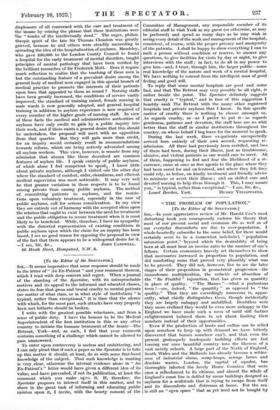[To the Editor of the SPECTATOR.] Sia,—It seems imperative that
some response should be made to the letter of " An Ex-Patient " and your comment thereon, which I read with deep concern and regret. When a journal of the standing of the Spectator, with its unimpeachable motives and its appeal to the informed and educated classes, states its fear that gross and brutal cruelty to mental patients (no matter of what class, or in what style of institution) " is typical, rather than exceptional," it is time that the silence with which, for the most part, such attacks have very properly been met hitherto should be broken.
I write with the greatest possible reluctance, and from a sense of public duty. I have the honour to be the Medical Superintendent of the first institution in this or any other country to initiate the humane treatment of the insane—The Retreat, York—and, as such, I feel that your comment contains something of a challenge which cannot be allowed to pass unanswered.
To enter upon controversy is useless and embittering, and I can only plead that if such a paper as the Spectator is to take up this matter it should, -at least, do so with some first-hand knowledge of the subject. That such knowledge is wanting is very clear, otherwise the internal evidence alone in " An Ex-Patient's " letter would have given a different idea of its value, and have prevented, if not its publication, at least the comment which you make upon it. If, therefore, the Spectator proposes to interest itself in this matter, and to share in the great task of informing and educating public opinion upon it, I invite, with the hearty consent of the Committee of Management, any responsible member of its editorial staff to visit York as my guest (or otherwise, as may be preferred) and spend as many days as he may wish .in seeing every detail of the work and management of the hospital, consistent, of course, with the proper privacy and anonymity of the patients. I shall be happy to show everything I can to such a person without condition or reserve, to answer any questions, to give facilities for visits by day or night, to give interviews with the staff ; in fact, to do all in my power to give him—and, I trust, through him, the larger public—some real knowledge of the nature and work of a mental hospital. We have nothing to conceal from the intelligent man of good feeling and good will.
To reply that some mental hospitals are good and some bad, and that The Retreat may very possibly be all right, is rather beside the point. The Spectator definitely suggests that cruelty is " typical," and in face of this suggestion I heartily rank The Retreat with the many other registered hospitals and private asylums that I know. In this specific matter of cruelty there is nothing to choose amongst us. As regards cruelty, or—as I prefer to put it—as regards gentleness, patience and devotion, the staff here are no whit better than the staff in similar institutions throughout the country, on whose behalf I beg leave for the moment to speak.
During the last week, three ex-patients unexpectedly arrived here entirely of their own accord, requesting re- admission. All three had previously been certified, and two of them had been, during their illness, just as troublesome, abusive, and violent patients as one would care to meet. All of them, happening to feel and fear the likelihood of a re- currence, came at once as free agents to the place where they had been cared for and understood, and where they felt they could rely, as before, on kindly treatment and friendly advice to minimize or avert their illness ; and on skilled care and devoted nursing to help them through it. This, I may assure you, " is typical, rather than exceptional."—I am, Sir, &c.,


































































 Previous page
Previous page